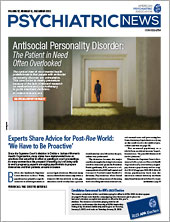Name almost any of the biggest issues facing psychiatry today—a burned-out workforce, unstable reimbursements, the increasing corporatization of medicine, an evolving pandemic—and not one can be solved within the four walls of a clinic room. This is where advocacy comes in. An essential skillset for physicians, advocacy allows us to translate our clinical experiences with patients into system-level change. Until enough psychiatrists engage in advocacy, we are at the mercy of insurers or others with a vested interest in dictating the direction of U.S. health care, putting priorities like patient and physician well-being at risk.
The concept of advocacy is not new. It comes to English from Old French, by way of Latin, derived from the Ancient Greek paráklētos—“one called to help, helper; comforter; protector, defender; legal advocate.” As this etymology suggests, medicine as a profession has held a “long-recognized responsibility to participate in activities to protect and promote the health of the public,” according to chapter 8 of the AMA Code of Ethics. This includes the duty affirmed by APA to “advocate for social, economic, educational, and political changes that ameliorate suffering and contribute to human well-being.”
Many physicians—whether trainee, early career, or established—want to advocate. But acquiring advocacy skills, just like clinical skills, requires experiential learning, mentorship, and continuous practice to build expertise. It is often a challenge to find advocacy mentors or advocacy skills training programs. Additionally, physicians in both academic and private practice often have difficulty justifying the time spent on advocacy endeavors, which may not be recognized or rewarded by their colleagues or institutions.
Here are three ways individuals and leaders can support the development of advocacy skills for psychiatry trainees and faculty:
•
Accreditation Council on Graduate Medical Education (ACGME) and medical education: ACGME requirements for psychiatry residency programs state that “residents must demonstrate competence in advocating for the promotion of mental health and the prevention of mental disorders.” Despite this, most psychiatry residency programs do not include advocacy skills training in their GME requirements. Contrast this with pediatric residency, where ACGME requires “ambulatory experiences to include elements of community pediatrics and child advocacy.” Specifically including advocacy as an ACGME requirement would allow psychiatry program directors to justify dedicating valuable curricular time to these topics. Without this, residents and fellows may not be able to find time or mentors for developing advocacy skills.
•
Academic promotion: All academic psychiatrists undergo an academic review process, during which time their teaching and scholarly endeavors are reviewed by faculty and administrators. These reviews are essential for promotion. However, institutions do not typically recognize advocacy activities or expertise as qualifying contributions, which directly de-incentivizes this work and indirectly perpetuates a culture that devalues these skills. By recognizing advocacy activities, academic institutions can promote an environment in which faculty are incentivized to build advocacy expertise and provide advocacy mentorship for trainees.
•
Organized medicine, including APA: Organized medicine and professional medical associations typically recognize the importance of advocacy and often have councils or committees on which physicians sit to help direct the future of the profession. This October, I was heartened to see psychiatrists from across the country excited to hone their advocacy skills at the 2022 APA State Advocacy Conference in Minneapolis (
APA Unveils Prior Authorization Model Legislation). Some attendees reported connecting with their elected officials right away. In addition to attending advocacy education opportunities such as this, we can also elevate advocacy during our engagement with other organizations such as the Association of American Medical Colleges, ACGME, the American Board of Psychiatry and Neurology, and the American Association of Directors of Psychiatric Residency Training. Through these collaborations, the importance of advocacy education and expertise can be highlighted and potentially implemented into training and CME.
Advocacy is an essential skill for all psychiatrists. Without understanding how to advocate, I would not be able to get my patients their needed medications, levels of care and programs, or future appointments. We need to do so much more, and it is my sincere hope that all psychiatrists learn how to advocate so that we might have a voice in the future of health care.

